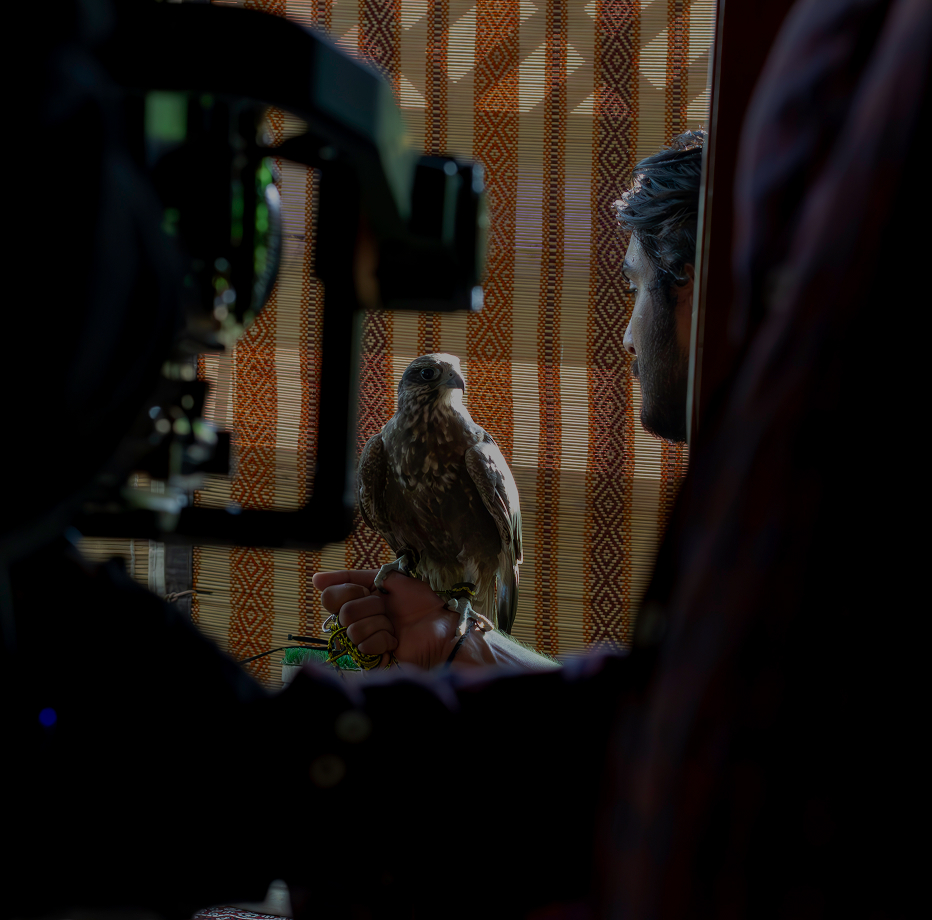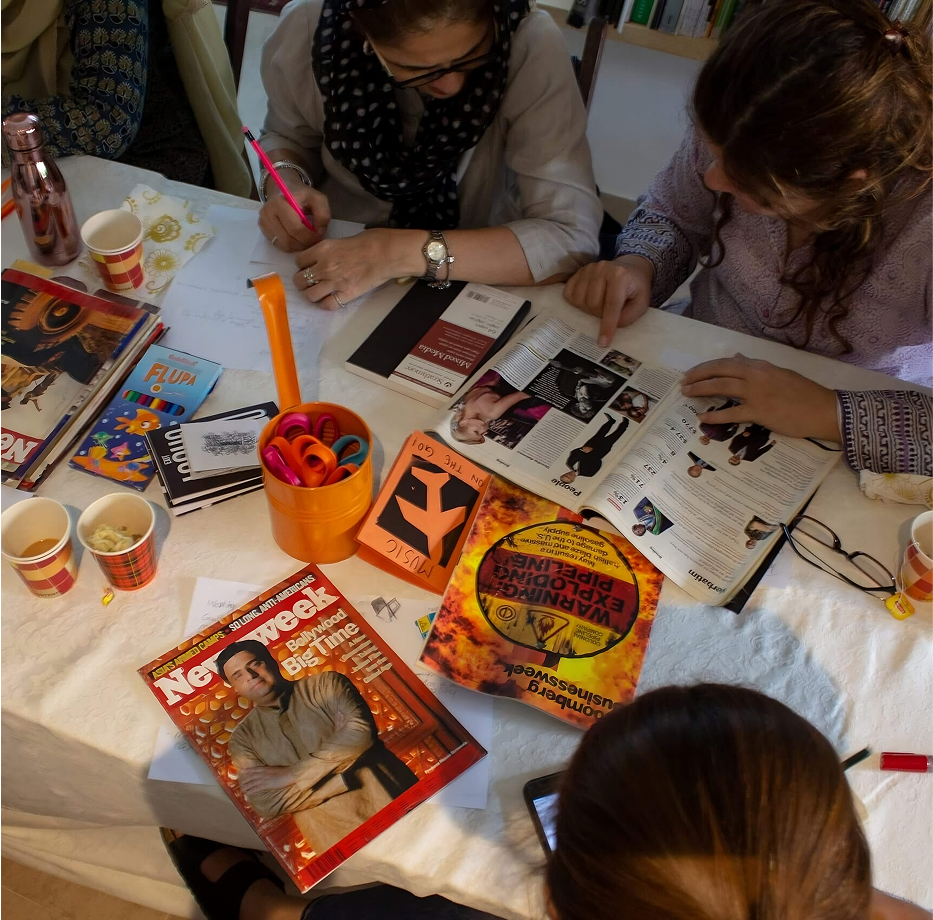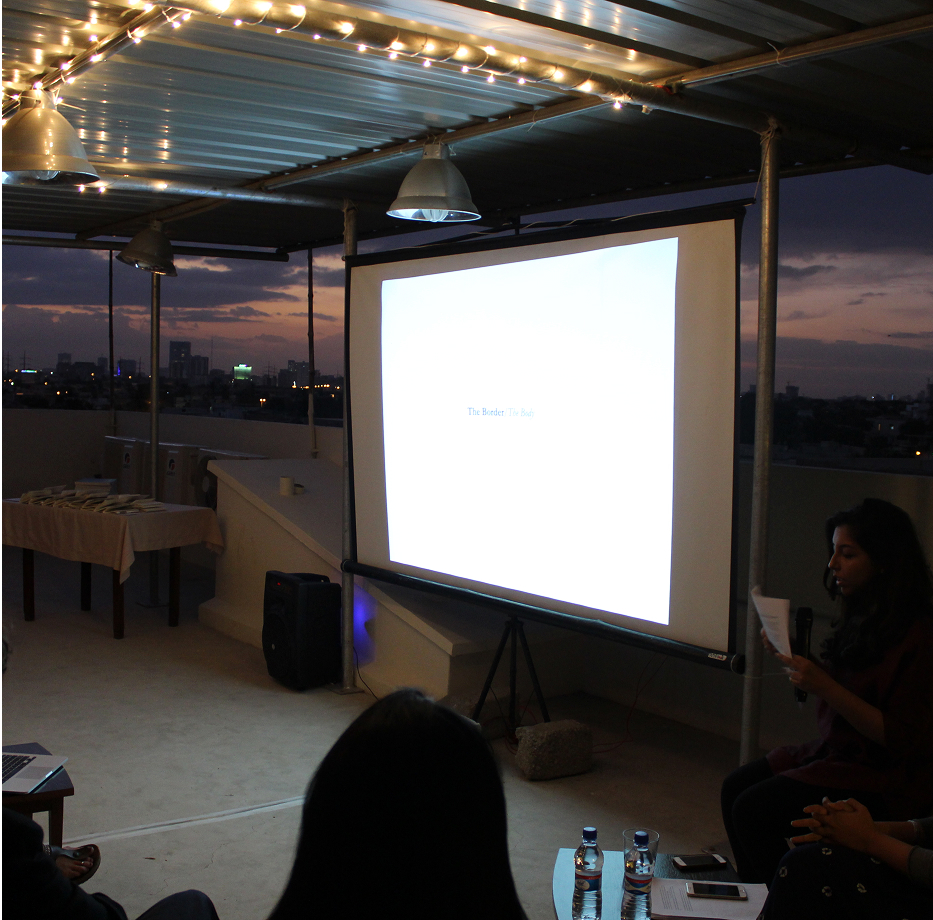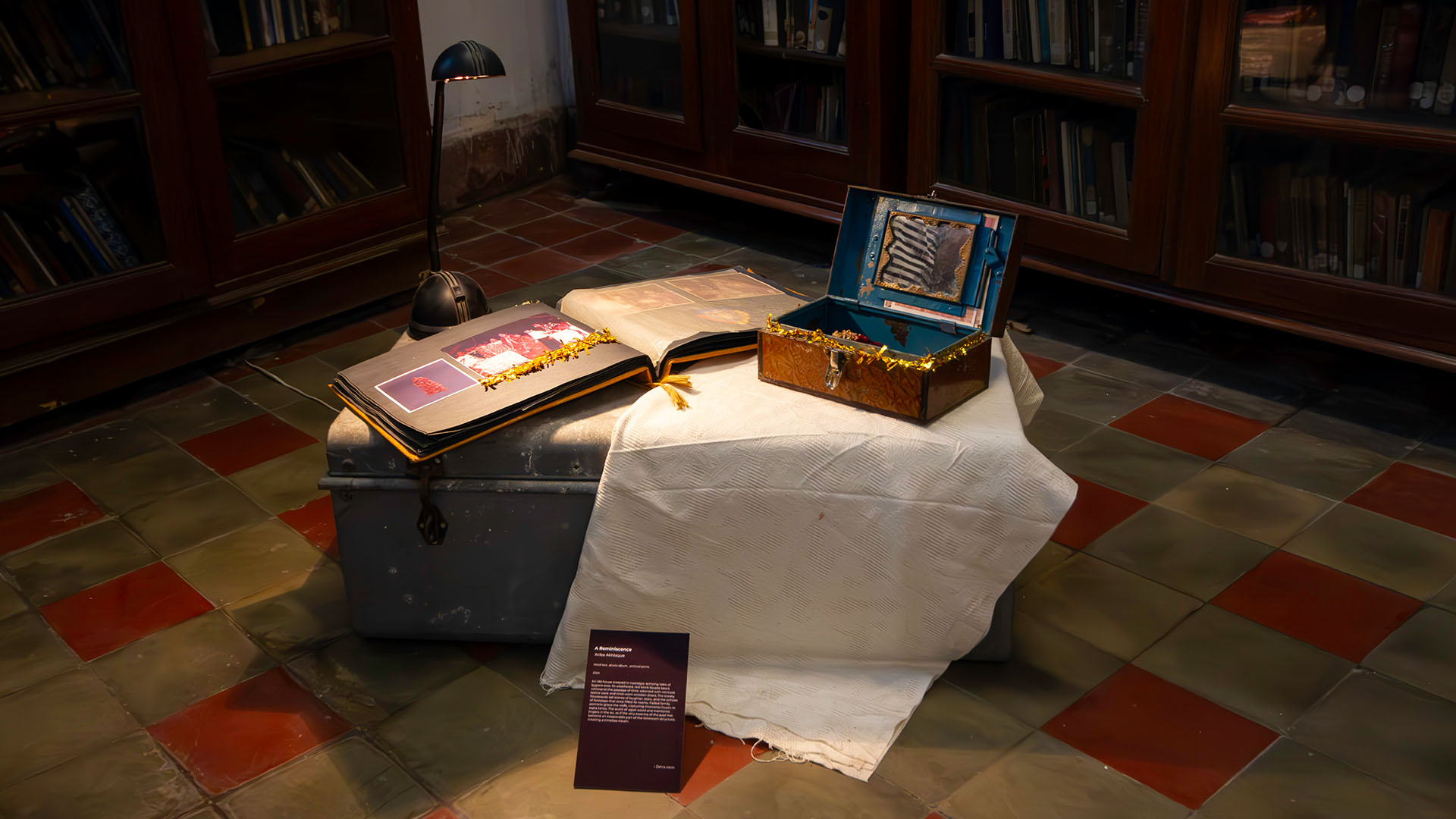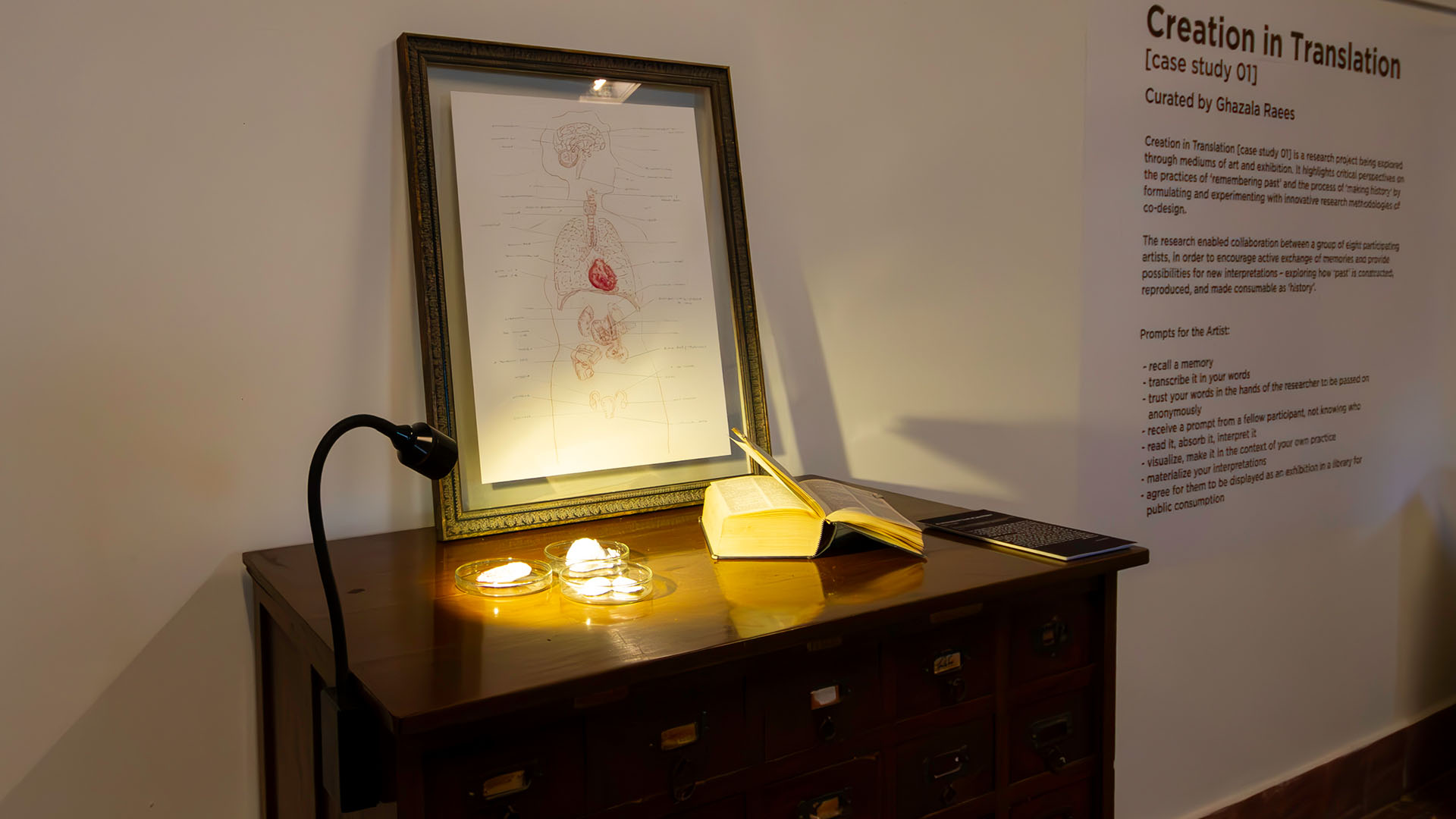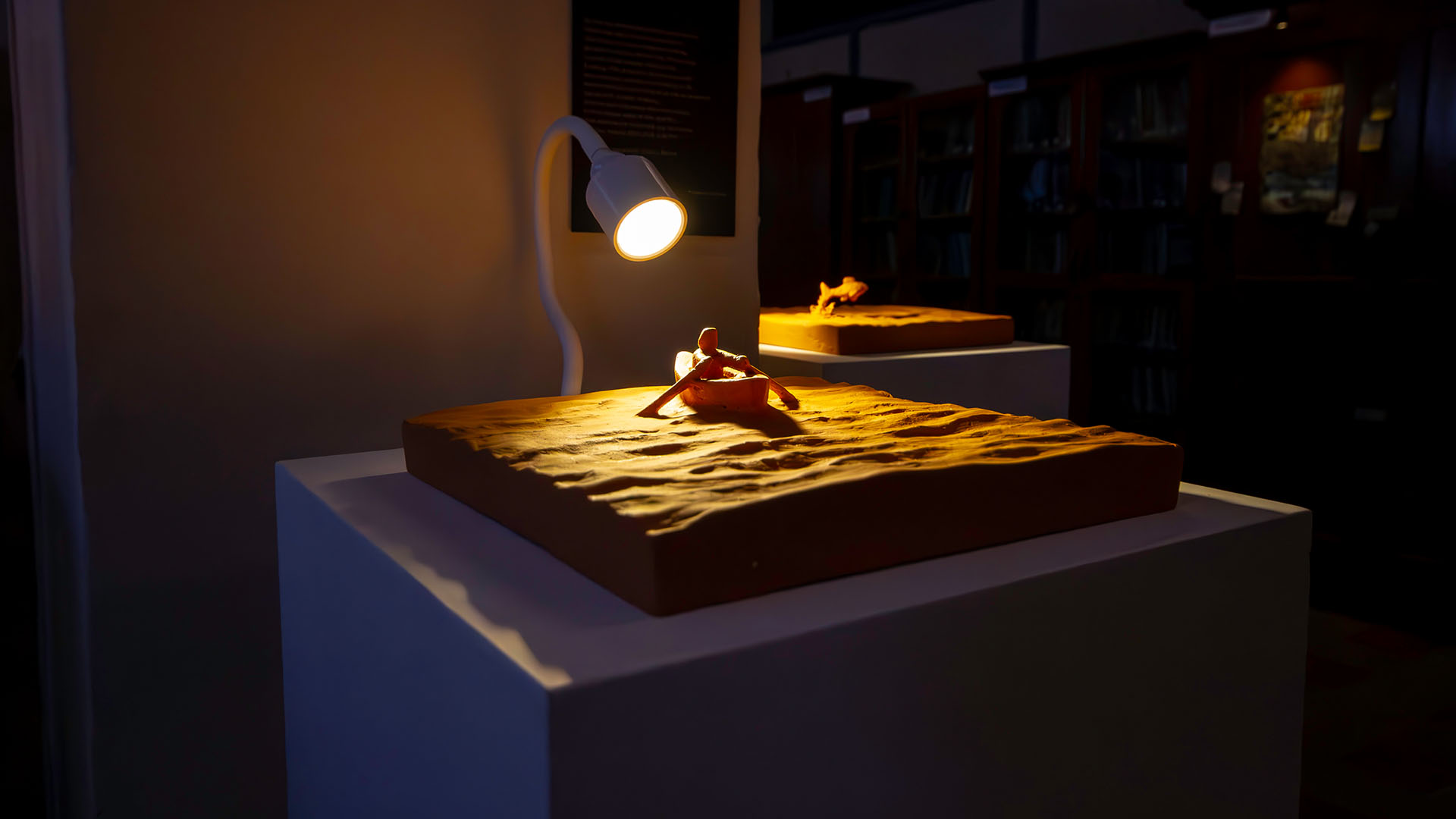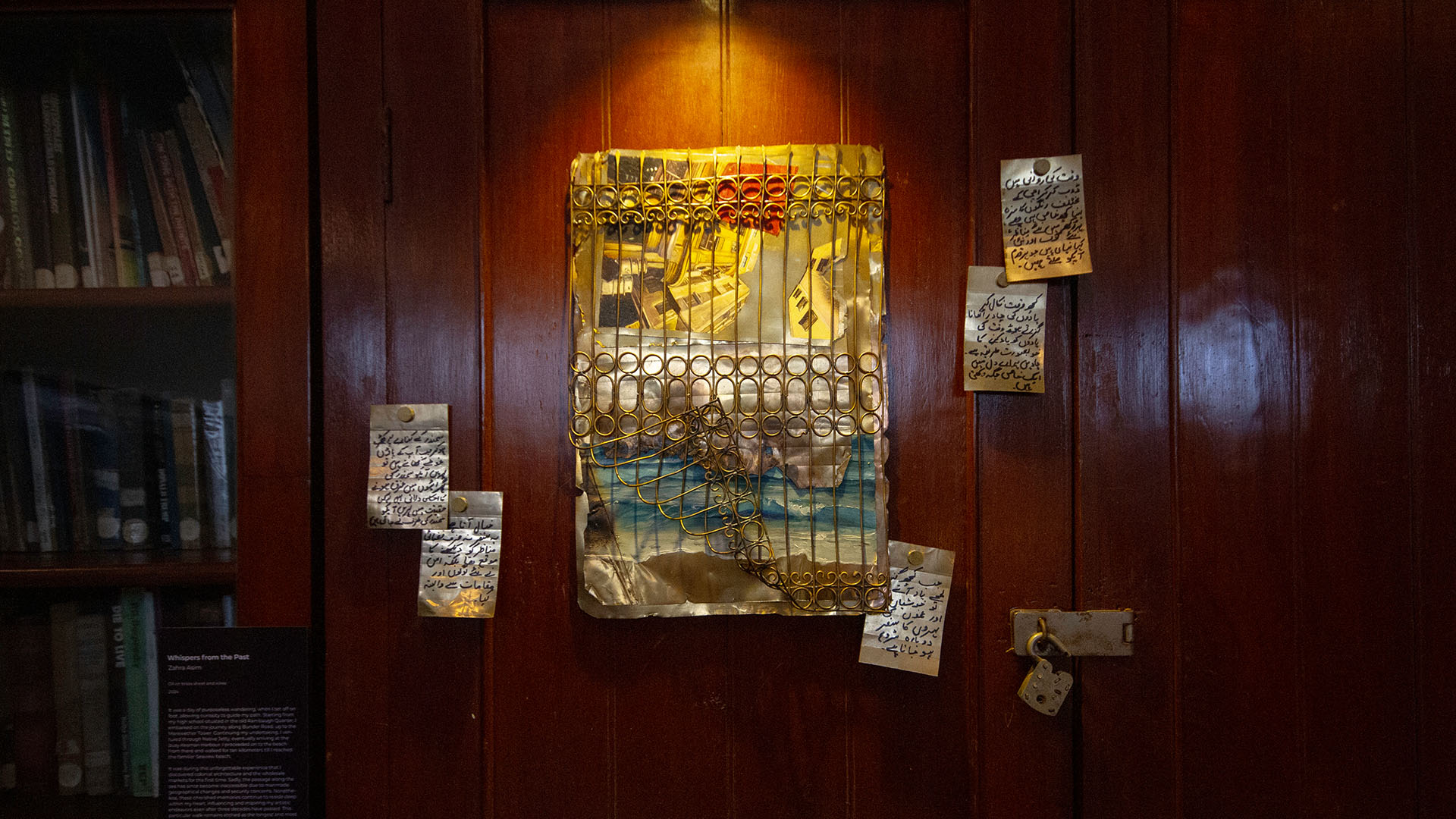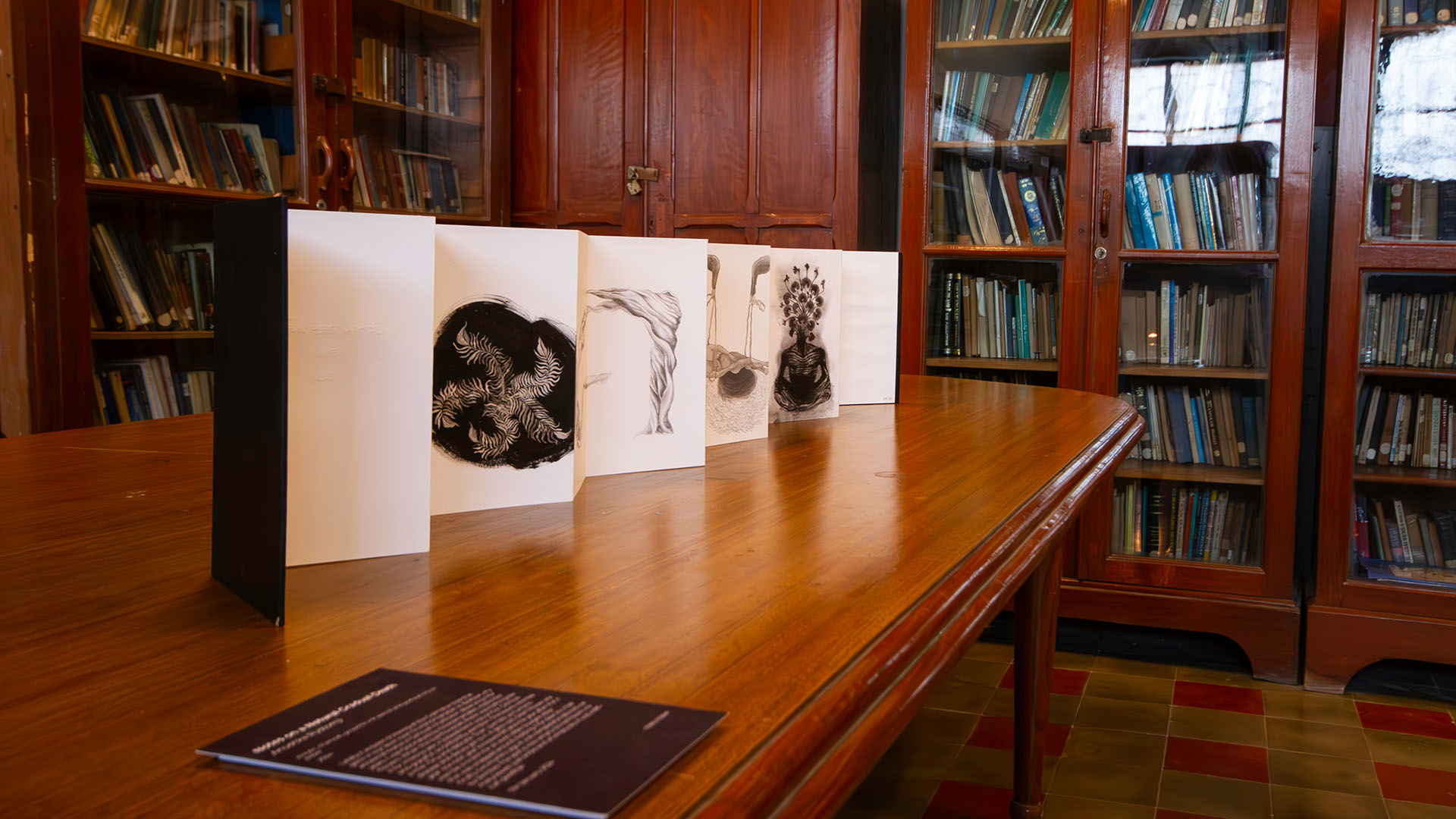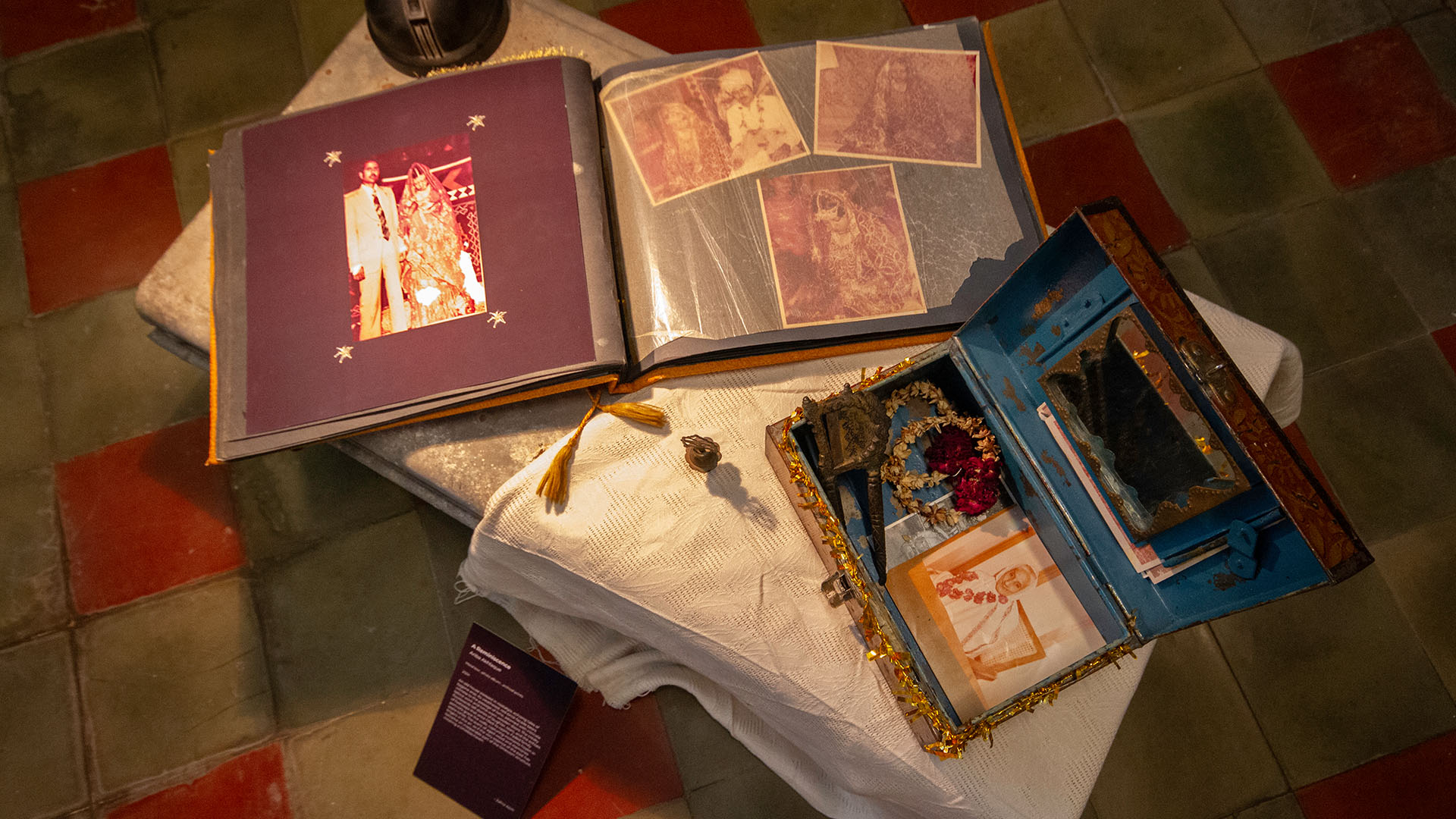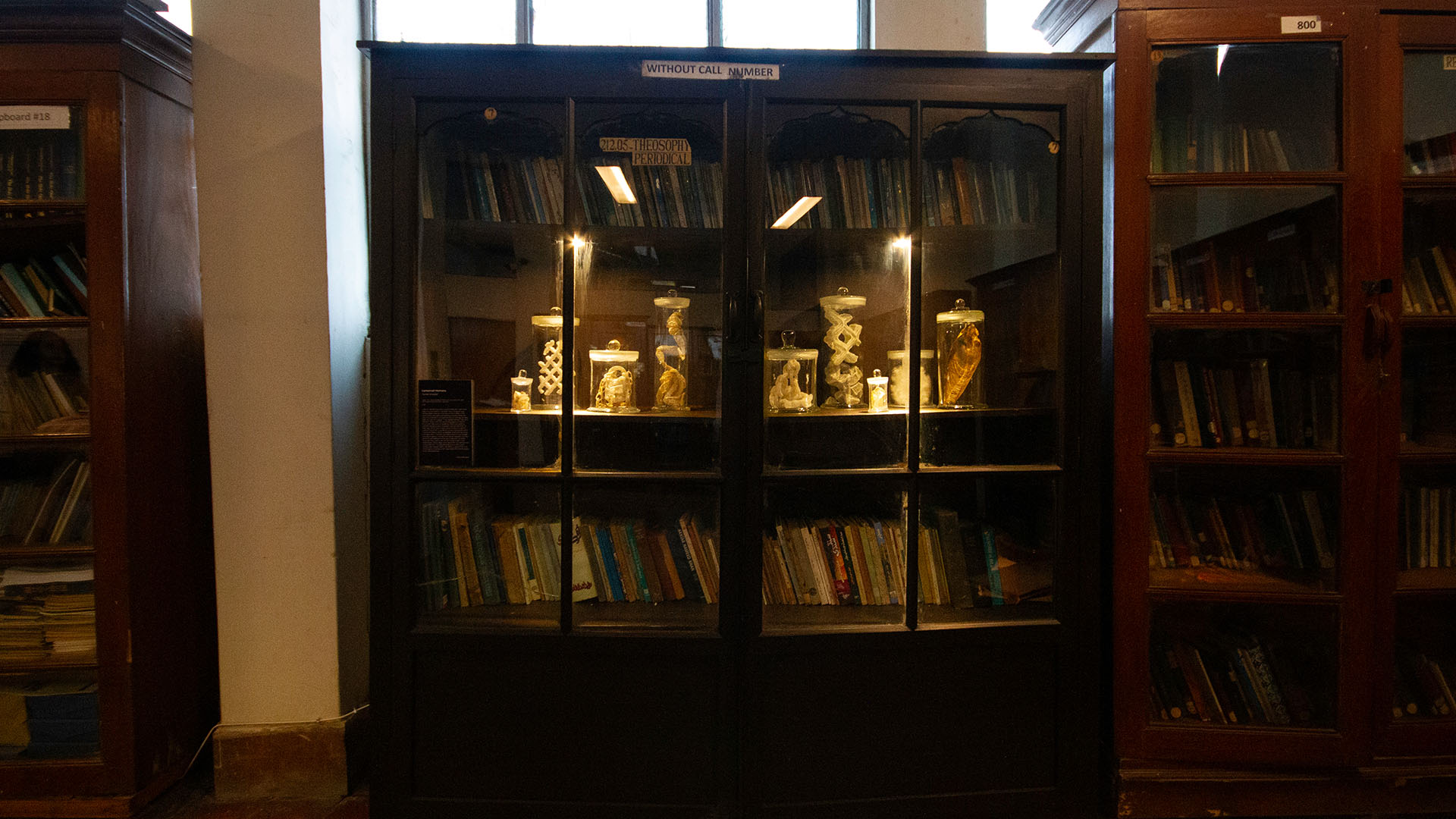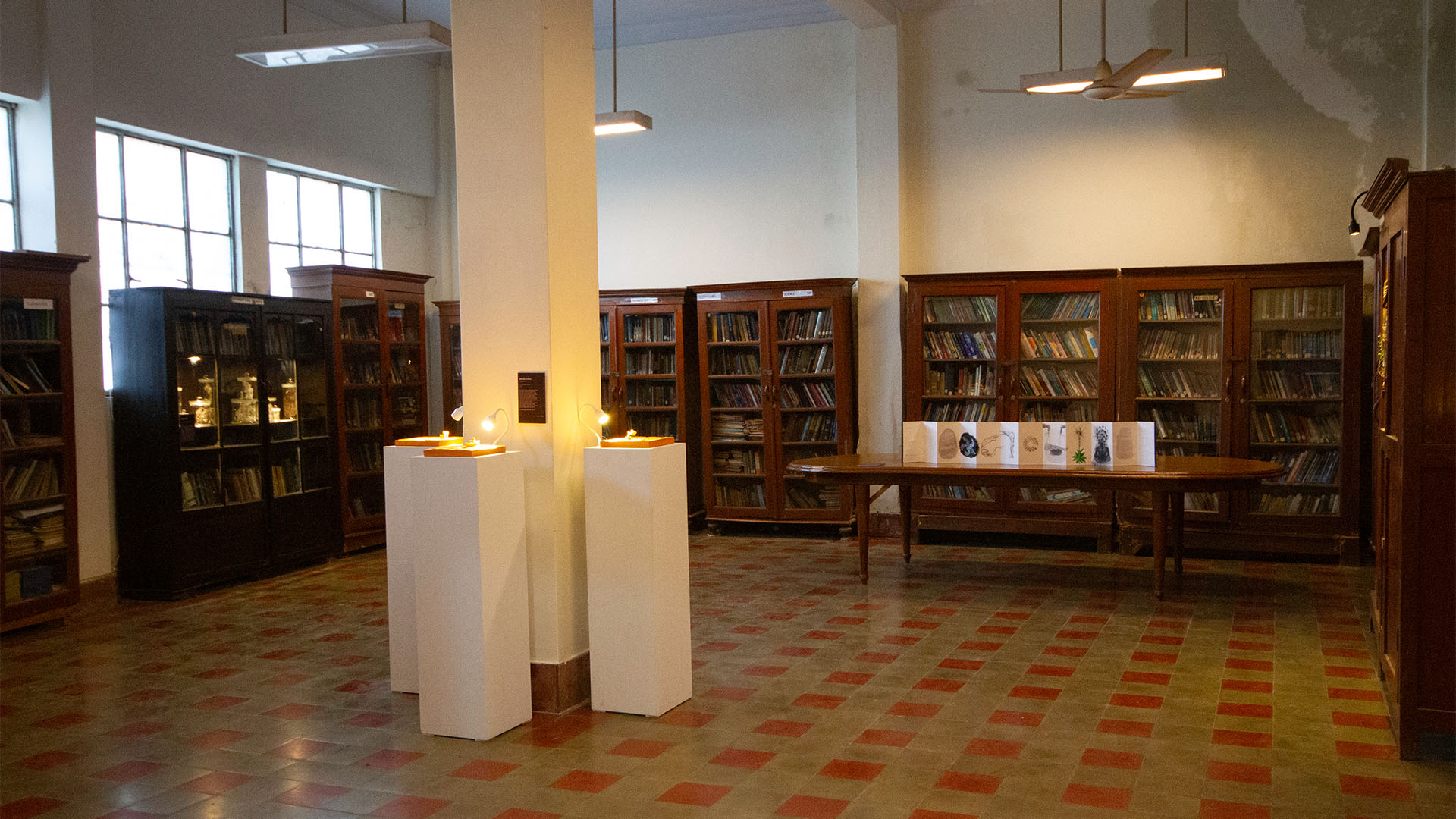Creation in Translation | Curated by Ghazala Raees
About
Creation in Translation [case study 01] is a research project being explored through mediums of art and exhibition. It highlights critical perspectives on the practices of ‘remembering past’ and the process of ‘making history’ by formulating and experimenting with innovative research methodologies of co-design.
The research enabled collaboration between a group of eight participating artists, in order to encourage active exchange of memories and provide possibilities for new interpretations – exploring how ‘past’ is constructed, reproduced, and made consumable as ‘history’. The artist were asked to write a short text describing a memory of sentimental value which was then swapped amongst the group anonymously. The artists then developed artworks in reference to the anonymous text that they had received. In addition to the artworks of these eight artists, the exhibition also includes an animation display of ‘Whereabouts Unknown / Ata Pata Maloom Nahin by Sophia Balaghamwala as well as an interactive compilation of personal histories collected through an open call.
The Library iteration, exhibited at the Theosophical Society Library on 28th April 2024 serves as the first case study for this research experiment.
Curatorial Note
History is a field that philosophers, academics, artists and thinkers have attempted to conceptualize in multiple ways over time. Some saw it as the only significant and essential truth, some deemed the weight of history as destructive, while others expanded its scope by shifting focus towards ideas of multiple histories.
In the everyday lives of individuals, history appears to fulfill a need that is quite essential and fundamental. Like mythology, philosophy and religion, history provides the means for people to make sense of their surroundings. It anchors each individual experience to a collective, larger narrative, making the enormity of the world comprehensible. History functions as the foundation that provides a starting point, a position to contextualize and situate every personal story in.
Creation in Translation [case study 01] is an investigation into the techniques that may have constructed these foundations. It is an exploration of the strategies that have led to ‘certain positions’ being marked as the starting points. By observing the knowledge of history as something derived out of transitions, translations, active exchanges, interpretations and imaginations it questions how these processes take place and what they may entail. How do memories transform into history? Which past is remembered as ‘the past’? What gets lost in this journey and what layers are added? This project not only highlight these critical concerns but sets in motion a series of exchanges to imagine and realize the ‘creation’ that occurs at the various stages of this process.
Developed through a methodology that employs mechanisms of retelling, reinterpreting, reimagining and remaking the collection presented at case study 01 of this research demonstrates the ‘processing of past’ as practices of documentation, preservation, museumification, fictionalizing and visualizing in images/text. It plays with the ideas of visibility and invisibility, politics of display and language to question what ‘becomes’ through these series and acts of creation. A library space as the setting for this exhibition further comments on the role of institutions such as education, museums and books that legitimize, validate and disseminate this knowledge.
Creation in Translation [case study 01] emphasizes on the active, participatory and living practice of knowledge making. It compels viewers to acknowledge the underlying patterns of this process and situate themselves as an agent of such creation. As in any research, this case study too leads to new observations and unanticipated avenues for analysis, setting the stage for a Creation in Translation [case study 02]
Ghazala Raees – Curator
Ghazala Raees is a researcher and emerging curator working as a Lecturer in the Department of Cultural Studies, National College of Arts, Lahore. She received her Bachelors in Visual Communication Design from NCA and went on to study Critical Media and Cultural Studies at the School for Oriental and African Studies (SOAS), UK. Her practice explores the potential of exhibitions as mediums of expression, emphasizing on the ideas of reading ‘exhibitions as artworks’.
Ghazala Raees recently curated Consolidated Spaces at Haam Gallery Lahore (2023), an exhibition derived from June Collectives artist residency. She was assistant curator for Allomorphs of an Antecedent, a site specific exhibition by The Roadside (2023) and was on the curatorial team for Be(Coming) The Museum, exhibited in at Lahore Museum (2023). She was a co-curator for Supavenezia exhibited at AplusA Gallery, Venice (2022). Under The Citizens Archive of Pakistan, she conceptualized and executed Maazi ki Saa’aatain, a collateral exhibition to LB02 at the National History Museum (2020). She was awarded a scholarship by NCA to pursue a summer program in curatorial practice at the School for Curatorial Studies in Venice. Raees is a core team member of the UNSECO Chair in Conservation & Management of Historic Urban Centers at NCA. She is currently one of the resident curators for the Curators Residency 2023 at Vasl Artists Association in collaboration with Gasworks London and the British Council.
Aritist Bio’s
Ariba Akhlaque
Ariba Akhlaque is a multidisciplinary artist based in Karachi, Pakistan. She completed her Bachelor’s in Fine Art, specializing in printmaking and new media art, from Indus Valley School of Art and Architecture.
Ariba’s artistic approach combines both traditional and digital techniques. She has showcased her artwork in various exhibitions, both in Pakistan and internationally. Notable group shows include the Koel Gallery, Full Circle Gallery in 2022, Haam Gallery in Lahore, and Art Incept India. In 2023, she was honored with a solo exhibition at the Triveni Sangam Gallery in India. Ariba was also a part of a year-long museum project called ‘Museum of Blue,’ supported by Vasl Artist Association and AIIR. Her artwork revolves around themes of personal grief, loss, and the passage of time. She expresses these emotions through mediums such as cyanotype, scanography, and photography.
Anushka Rustomji
Anushka Rustomji is a visual artist whose practice examines themes of cultural and historical erasure, duality, and transcendence. Her works are influenced by the visual representations of mythologies and cross-cultural sacred practices and traditions of the Global South.
She is an alumna of the National College of Arts, Lahore (2011) and was a participant in the 2015 Pilotenkueche artist residency (Leipzig, Germany). Rustomji has exhibited her work internationally, including at the recent Colomboscope festival (Colombo, Sri Lanka, 2024). Her work has been published in ‘Lines in the Sand; Contemporary Art from Pakistan’, (Imago Mundi, Luciano Benetton Collection, 2017) and ‘Between Quarantine and Quest’, (Vasl Artists Association, 2022). She is an MA candidate at the National College of Arts, Lahore and is a faculty member at the Indus Valley School of Art and Architecture, Karachi.
Ayaz Jokhio
Ayaz Jokhio uses installation, drawing, painting and text to pose questions about the ways in which we regard and represent our world, often also commenting on the conventions of gallery display. His work has been shown in numerous group and solo exhibitions in Pakistan and abroad. He has been a resident artist is Switzerland, Germany and Japan and is currently teaching at the Beaconhouse National University.
Haider Ali Naqvi
Haider Ali Naqvi, born in Karachi, Pakistan in 1992, earned his BFA from the National College of Arts (NCA), Lahore in 2015, where he was honored with a Distinction in Thesis and the Sr. Percy Brown Award for Excellence in History of Arts. Naqvi’s artistic journey includes notable residencies such as articulate studios, Lahore in 2023, the Gasworks Artist Residency in the UK in 2019, a solo residency at VASL in 2018, and residencies at Sanat Initiative in 2017 and Avant-garde and Kitsch gallery in 2015. In 2023, he received the Nigaah Art Prize in the drawing category, and in 2019, he was awarded the Imran Mir Art Prize for emerging artists from Pakistan.
Currently serving as permanent faculty in the Department of Fine Art at Indus Valley School of Art and Architecture, Haider Naqvi’s work has been showcased extensively both nationally and internationally. His artistic expression is deeply rooted in his diverse travel experiences and the spaces he inhabits, with a particular fascination for architectural environments and human interaction within them.
Nairah Sharjeal
Nairah Sharjeal is a multidisciplinary artist currently based in Lahore, Pakistan. She completed her visual arts degree from the National College of Arts, Lahore in 2017, majoring in painting where she received a distinction for her efforts. Nairah is also a recipient of the Shakir Ali Award for the highest merit in the department of fine arts from her alma mater, 2017, as well as the Anna Molka Award for the 3D sculpture category, 2022. Her art practice extends over a variety of disciplines within the art realm with current focus on sculpture and installation. Her works revolve around themes such as nostalgia, collective memories, the human condition and material culture, while also exploring tensions between the dualities of life such as organic vs. inorganic or fragile vs. robust. Nairah has exhibited her works locally at numerous venues such as a collateral event of the Lahore Biennale 01, titled Four Rooms, 2018 and another Lahore Biennale Foundation collateral, A Site for Sight in 2019. She has further exhibited at a group show titled Sculptor/Sculpture at the Como Museum, Lahore, 2022. She was also a chosen candidate for the Art Saraye residency organized by Art Otaq which culminated into an exhibition by the name ‘Numaish Art Saraye’ 2022. She has also recently participated in a group show titled Coincide 23 and another show titled ‘A state of Despair’ in Karachi, 2023.
Nisha Hasan
Nisha Hasan lives and divides her time in Lahore and Sahiwal. She graduated from the National College of Arts, Lahore in 2011, majoring in Painting. Since then, she has done numerous courses from the King’s Foundation, School of Traditional Arts, London. She paints primarily in egg tempera and has started developing a parallel research in pigment making, traditional materials and techniques and their contemporary context. She is currently engaged as visiting faculty at the National College of Arts, Lahore.
Her work looks at abandonment (of spaces, humans, animals, plants and objects) as an immediate action, and ruination (from neglect, desertion, decay and disease) as a process. The references and materials for her work come from but are not limited to poetry and literature, photographs and negatives, family archives and pre-owned objects.
Sohail Zuberi
Sohail Zuberi is a multidisciplinary artist based in Karachi, Pakistan. His practice is a commentary on Karachi’s urban developments, dichotomies and disparities. Zuberi’s on-going research on the changing ecologies of a small stretch of beach in Karachi, manifested in solo showings – Archaeologies of Tomorrow – in 2018 and 2022. He was commissioned to produce work for Karachi Biennale 2017 and 2019. Zuberi has been associated with academia for almost two decades. He served as the head of the Communication Design department at the Indus Valley School of Art and Architecture, and has taught design, fine art and photography at the University of Karachi and the Textile Institute of Pakistan. He also guest lectured at the Eindohoven Design Academy, The Netherlands. Zuberi is also a former trustee of Vasl Artists’ Collective, served on the board of Pakistan Chowk Cultural Centre, and was a core team member of Numaish-Karachi. He has attended numerous residencies, workshops and conferences in South Asia, Europe and North America. Zuberi was a part of Ajam Media Collective’s residency at the second iteration of Lahore Biennale 2020 and was the curator for the International Public Art Festival (IPAF 2020), Karachi. He also works as a design consultant with Tali, a contemporary craft design brand, and works as an adjunct faculty at the Indus Valley School of Art and Architecture.
Zahra Asim
Zahra Asim is a visual artist based in Lahore, Pakistan. She graduated with a degree in Fine Arts from National College of Arts, Lahore in 2014 and completed her Masters in Art and Design from Beaconhouse National University, Lahore in 2019. It has been 10 years since she has been painting professionally and has exhibited her work in numerous group shows both nationally and internationally.
Sophia Balagamwala
Sophia Balagamwala is a multidisciplinary artist and curator based in Karachi. Grounded in archives and museum collections, her practice merges real and fabricated events to explore entanglements between colonial histories, national narratives and personal histories in South Asia.
Balagamwala has a BA from the University of Toronto (2010) and an MFA from Cornell University (2014). She has previously worked as the Lead Curator of the National History Museum in Lahore, and is currently an advisor for the Citizens Archive of Pakistan (CAP). Balagamwala curates a collection of local artist publications under the Kurachee Reading Room, housed previously at the COMO Museum in Lahore, (2021-2022), and currently at the AAN Ideas LAB (Art Space & Museum) in Karachi.
She teaches at the Indus Valley School of Art and Architecture.
